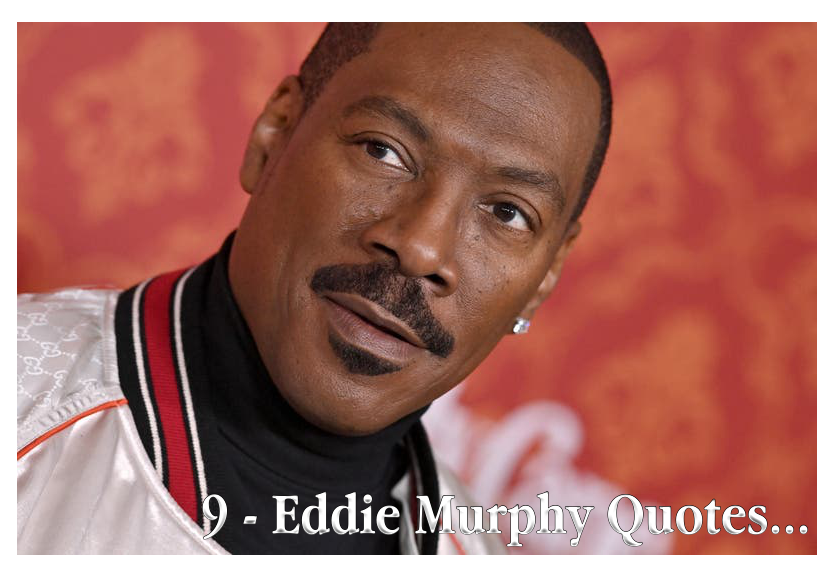(ThyBlackMan.com) Eddie Murphy is one of the most influential entertainers of the last half century, a figure whose work has shaped comedy, film, music, and pop culture in ways few could ever match. His sharp wit, global reach, and unparalleled ability to evolve make him a unique cultural figure whose words often reveal more wisdom than his audiences expect. Beneath the jokes is a man who has studied fame, family, legacy, and creativity from a front row seat. These nine quotes offer insight into how Murphy understands his life, his industry, and the larger Black experience in the Americas. From career freedom to reflections on aging, relationships, and creative authenticity, each quote reveals a different layer of a man who remains one of the most important entertainers of his generation.
Below is an exploration of each quote, connecting its meaning to modern cultural dynamics and offering context for why Murphy’s reflections still resonate today.

1. “I’m in a position that allows me to do what I want to do, and I do it.”
This quote marks Murphy’s understanding of creative autonomy. Few entertainers reach a point where they can fully choose their projects without concern for external approval or survival. Murphy earned this through a combination of remarkable commercial success, cultural impact, and longevity. From his early days on Saturday Night Live to his blockbuster run in the nineteen eighties and nineteen nineties, Murphy positioned himself as a once in a lifetime talent. When he speaks of being able to do what he wants, he is acknowledging that he has reached a rare level of artistic independence built on decades of hit films and cultural capital.
This autonomy is important in the broader context of Black entertainers in Hollywood. Historically, African American performers faced limited roles, typecasting, and systemic barriers. Murphy rose during a period when those barriers were beginning to crack, and he widened those openings for others. His ability to choose his own path stands in contrast to earlier generations who were constrained by a rigid system. Murphy’s words highlight not just personal success but the evolution of opportunity for Black performers who now command major platforms and global audiences.
Today, creative freedom is still a major theme in entertainment. Younger artists fight for ownership of their work, control over distribution, and the ability to shape narratives that reflect genuine experiences. Murphy’s statement resonates with this modern struggle for autonomy in an era dominated by streaming companies, franchise demands, and algorithm driven content. His journey serves as a reminder that independence is earned through consistency, reinvention, and cultural relevance.
Ultimately, Murphy’s quote speaks to the confidence of a man at peace with his achievements. It reflects a lifetime of labor, discipline, and resilience. In an age where many artists feel pressured to chase trends or satisfy online chatter, his words encourage long term thinking and self leadership. Murphy represents what happens when a creative person learns to steer their own ship.
2. “Music has always been around with me.”
Though Eddie Murphy is best known as a comedian and actor, he has always had a deep connection to music. This statement underscores the early influence of rhythm, melody, and performance in his life. Growing up in New York during a time of soul, funk, disco, and early hip hop gave him a soundtrack that followed him into adulthood. Long before he recorded his hit single “Party All the Time,” Murphy viewed music as a companion that shaped his artistic instincts and emotional landscape.
This quote also speaks to the way music functions within Black cultural identity. For African Americans, music has been an anchor for expression, resistance, joy, storytelling, and survival. Genres such as gospel, blues, jazz, soul, and rap were not just sounds but reflections of collective memory. Murphy’s acknowledgment that music has always been with him places him within a longer tradition where Black artists carry music as both inheritance and tool.
Many entertainers cross between mediums today, from actors becoming musicians to influencers entering the recording booth. Murphy’s experience predates this modern fluidity. He was blending film, comedy, and music long before it became common in pop culture. His statement reveals that music was never an afterthought or side hobby. It was part of his internal rhythm that informed his timing, characterization, and creativity.
In the modern era, where music is accessible everywhere through streaming and social media, Murphy’s quote feels even more relatable. Music is no longer confined to albums and concerts. It is embedded into daily life. His words reflect a timeless truth: music has the power to follow us, shape us, and accompany our evolution. For Murphy, it was both background and foundation, something that made his artistic energy possible.
3. “I never hated hip hop. It became the new rock and roll. It became the biggest thing that Africans have ever done in the history of the Americas. Hip hop put more Black Americans on than anything before it. It fed more people. It allowed them to diversify into clothing lines and billion dollar headphone companies.”
This is one of Eddie Murphy’s most profound cultural observations. As someone who witnessed the entire birth and evolution of hip hop, Murphy recognizes the genre not only as music but as a revolutionary global movement. His words position hip hop as the most economically transformative cultural force ever created by African descendants in the Western Hemisphere. This is a historic claim rooted in economic reality and cultural influence.
Hip hop’s impact cannot be overstated. It created new wealth pathways for communities that had long been shut out of major economic systems. Murphy’s acknowledgment that hip hop fed more people than any previous cultural creation points to its role in providing jobs, industries, and generational wealth. From record labels to fashion brands to global partnerships, hip hop built multimillion dollar and billion dollar enterprises that reshaped American consumer culture.
Murphy also reframes hip hop as the new rock and roll. This statement positions the genre not simply as a niche cultural form but as the defining music of its era. Like rock and roll in the nineteen fifties and sixties, hip hop became the voice of youth, rebellion, innovation, and social commentary. It became the soundtrack of urban life and later the world. Unlike rock, however, hip hop remained tied to Black identity even as it expanded globally.
Finally, his praise of hip hop entrepreneurship highlights a lesson for modern creators. Hip hop did not stop at music. It expanded into film, business, sports, activism, and technology. Murphy’s observation anticipates the present where rappers own television studios, beverage brands, shoe lines, and media companies. His quote honors hip hop’s role in transforming the very concept of Black economic power. It is both a celebration and a historic recognition of a culture that changed everything.
4. “I’m kind of long in the tooth to fly in in a cape now, so I’d have to be, like, the voice of reason or somebody. ‘Don’t do that, super fellow.’”
Here Murphy reflects on aging within Hollywood. The phrase “long in the tooth” signals self awareness and humor about being older in an industry that often worships youth. Murphy acknowledges that the era of chasing physically demanding superhero roles has passed for him. Instead, he imagines himself taking on the voice of reason, a supporting figure who guides others. This reveals both humility and insight into the natural evolution of an entertainer’s career.
The superhero genre dominates modern film culture, and many studios now seek aging actors for wise mentor roles. Murphy’s joke taps into this trend by imagining himself as the grounding presence instead of the caped crusader. Through humor, he is also addressing the pressure many actors feel to remain youthful even as the years advance. Murphy embraces his age instead of resisting it.
Culturally, his quote reflects a broader societal shift regarding aging. In earlier decades celebrities often hid signs of aging or fought them aggressively. Today public conversation about accepting maturity has grown stronger. Murphy’s willingness to reposition himself mirrors how many successful professionals evolve into mentors rather than front line performers. His words also speak to the dignity of embracing new seasons of life without clinging to outdated roles.
In a historical sense, aging in Hollywood has often been harder for Black performers. Opportunities were limited when they were young and often even narrower as they grew older. Murphy’s longevity, and his ability to joke about evolving roles, speaks to increased opportunity and broader recognition of talent. His humor disguised as humility offers a reflective lesson about embracing change rather than fearing it.
5. “Getting divorced didn’t sour me on the institution of marriage. I’ll tell you what I’ll never do. I’ll never get divorced again.”
This quote captures Murphy’s balance of optimism and realism regarding relationships. Divorce is painful, public, and often emotionally draining. Yet Murphy reveals he still believes in marriage. What changed is not the concept of love or commitment but his approach to partnership and the choices that come with it. He speaks from experience rather than bitterness, acknowledging growth while avoiding repeating past mistakes.
This quote also reflects a generational shift in attitudes toward marriage. Many people now approach marriage with more caution, therapy, and intentionality. Murphy’s perspective echoes a common sentiment: marriage itself is not the problem, but the way individuals enter it and behave within it. His vow to avoid another divorce is not a rejection of relationships but a commitment to stability.
In a larger cultural context, relationships among public figures are scrutinized heavily. Celebrities experience a level of exposure that can intensify conflict. Murphy’s statement about divorce must be understood within this spotlight. It shows a desire to maintain his private life with more maturity and privacy moving forward. It also illustrates how public figures often evolve after early life challenges.
Lastly, Murphy’s quote speaks to the universal human desire for emotional growth. Many people find themselves learning from past relationships and establishing new boundaries. Murphy’s humor softens the seriousness of the subject, but the underlying message is deeply relatable. He views marriage as an enduring institution worth preserving, but he is determined never to repeat the trauma that comes with divorce.
6. “I’ve always had confidence. It came because I have lots of initiative. I wanted to make something of myself.”
This quote highlights the foundational traits that shaped Murphy’s career. Confidence and initiative are central to his success. He entered the world of entertainment at a young age, driven by ambition and a clear sense of purpose. From stand up to film, he carried the conviction that he belonged on the biggest stages. His rise was not accidental. It was fueled by determination and relentless effort.
Historically, confidence has been a survival mechanism for Black entertainers navigating predominantly white industries. Murphy’s self assurance helped him resist stereotypes, break barriers, and redefine what Black comedy and film could look like. His initiative allowed him to create new lanes rather than wait for permission. By stating that he wanted to make something of himself, Murphy affirms the mindset shared by many trailblazers who challenged systemic limitations.
Today, Murphy’s message resonates across creative industries. Ambition and initiative remain essential, especially in an era where digital platforms allow new talents to bypass traditional gatekeepers. His quote serves as a motivational blueprint for anyone aiming to stand out in competitive fields. Confidence alone is not enough, but combined with initiative it becomes a powerful engine.
Murphy’s reflection also serves as a reminder that greatness begins with internal belief. Before he became a global superstar, he saw potential in himself. That belief propelled him forward even when the path was uncertain. His words encourage listeners to cultivate inner drive, trust their abilities, and pursue meaningful goals with intent. Murphy frames success as something that begins inside and expands outward.
7. “I don’t know what my Death Row meal would be. I’m surprised that people can even eat when they’re on Death Row.”
This quote reveals Murphy’s deep empathy and philosophical curiosity. While many people treat the concept of a “Death Row meal” as a casual question, Murphy confronts the harsh reality behind it. He recognizes the emotional gravity of facing execution and questions how anyone in such a situation could focus on food. His response rejects the trivialization of punishment and reflects his broader sense of humanity.
Historically, the idea of a final meal has roots in ancient customs meant to symbolically reconcile the condemned with society. In modern America, it became a pop culture curiosity, often stripped of emotional context. Murphy’s reaction challenges that detachment. He centers the humanity of incarcerated individuals rather than entertaining a sensationalized ritual. It is a brief but profound critique of how society views punishment.
In the modern era, conversations about criminal justice reform are widespread. Murphy’s quote fits into this larger cultural reconsideration of mass incarceration, the death penalty, and the lived experiences of prisoners. His discomfort with the idea of a final meal mirrors the discomfort many feel with the system as a whole. It is an example of how entertainers can use simple reflections to spark deeper thought.
Ultimately, this quote shows Murphy’s moral grounding. Beneath the humor lies a man who thinks critically about human dignity. He exposes the contradiction of asking someone facing death to choose a comforting meal. His comment turns a frivolous question into an ethical meditation that remains relevant today.
8. “As you get older, you get different, and I’m a mushier, softer person as I get older.”
This quote captures Murphy’s evolution from a sharp edged young comedian to a more reflective adult. Aging brings emotional transformation, and Murphy acknowledges this openly. The shift from toughness to softness is a natural part of life. His comment reflects a psychological maturation that many people experience when they move from survival mode to stability.
In the broader historical context, Black masculinity has often been framed through resilience, strength, and emotional restraint. Murphy’s openness challenges these stereotypes by embracing vulnerability. He shows that emotional growth does not weaken a man but deepens him. This represents a generational change where men feel more comfortable expressing softness and introspection.
Murphy’s statement also reflects the career evolution many entertainers undergo. Early fame often requires confidence, intensity, and self promotion. With age comes perspective. Murphy has lived long enough to appreciate family, peace, and emotional balance more than constant spotlight attention. His softer side aligns with a life focused on stability rather than proving oneself.
In contemporary culture, embracing emotional vulnerability is increasingly celebrated. Murphy’s honesty encourages audiences to allow themselves to evolve without shame. His acknowledgment that aging brings emotional change is a reminder that growth is both natural and necessary. His words resonate with anyone who has learned to open up as life progresses.
9. “The advice I would give to someone is to not take anyone’s advice.”
This final quote is classic Eddie Murphy: clever, paradoxical, and surprisingly wise. On the surface it appears humorous, but beneath the humor lies a powerful message about individuality and self direction. Murphy suggests that people must learn to rely on their own judgment rather than allowing others to dictate their choices. He champions autonomy as the foundation of personal success.
Historically, advice has been both a guiding force and a source of limitation. Many creative pioneers succeeded not because they followed instructions but because they broke rules. Murphy himself defied conventional wisdom throughout his career. His refusal to imitate others allowed him to innovate and define his own comedic language. His words emphasize that true originality comes from inner voice rather than external instruction.
In the modern world, advice is everywhere. Social media amplifies opinions from millions of strangers. Online influencers sell life strategies, business frameworks, and personal philosophies. Murphy’s quote is a counterbalance to this noise. He encourages people to trust themselves rather than treat advice as scripture. His message is especially relevant today when many individuals feel overwhelmed by conflicting information.
Ultimately, the paradox of the quote is the heart of its wisdom. By telling people not to take advice, Murphy is offering the most important advice of all: think for yourself. Be guided by your instincts. Do not allow others to dictate your path. In a world hungry for validation, his words are a liberating reminder that personal truth matters more than popular opinion.
Eddie Murphy’s words offer more than entertainment. They provide insight into creativity, aging, culture, identity, and emotional growth. Through humor and honesty, he explores themes that shape both personal lives and collective history. Each quote reveals a different facet of a man who has navigated global fame while remaining grounded in self reflection. Murphy’s perspective continues to resonate in a world where individuality, resilience, and authenticity matter more than ever.

















Leave a Reply